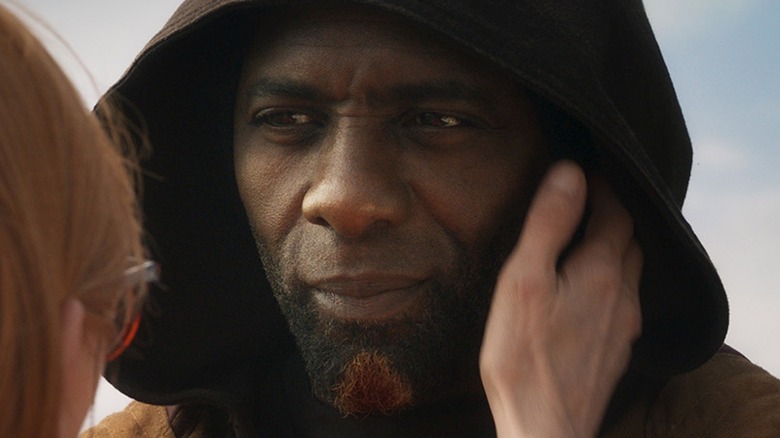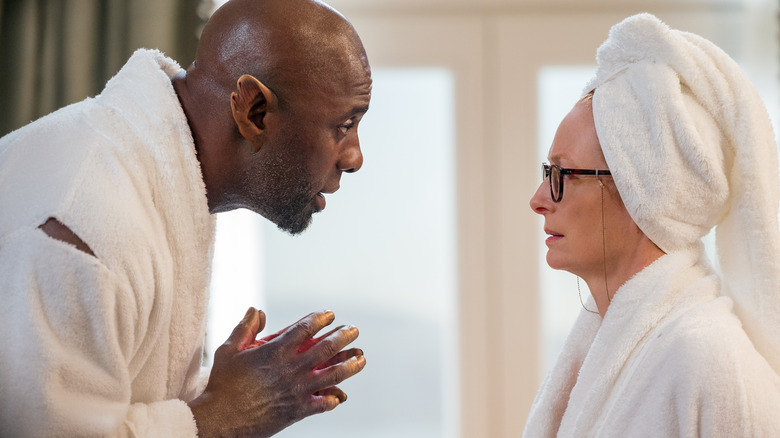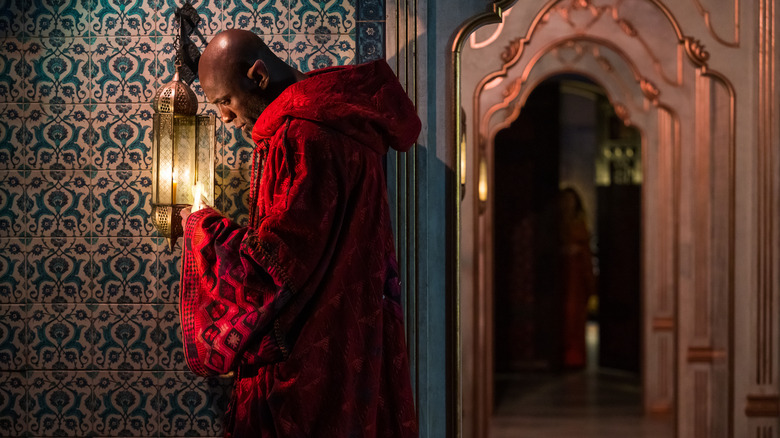Three Thousand Years Of Longing Review: An Eternal Story
- It looks gorgeous
- It's a really poignant exploration of stories
- Tilda Swinton and Idris Elba are both fantastic
- The story gets mired in its own back-and-forth framework sometimes, and it muddles the themes
Though he's best known to audiences for his post-apocalyptic series of "Mad Max" films, George Miller's career is one built on storytelling versatility and a near-endless sense of visual daring. From the "Babe" movies to "Happy Feet" to "The Witches of Eastwick," there's a curiosity that permeates his filmmaking style — energy that suggests he's willing to go just about anywhere in order to evoke a dazzling aura for the viewer. He's one of our boldest cinematic storytellers, even beyond the spectacle and scope of "Mad Max."
"Three Thousand Years of Longing," Miller's latest film, is perhaps the purest distillation of this boldness, this curiosity, this endless ambition. Set across centuries of history and imbued with an atmosphere of magic that suggests just about anything might happen onscreen, Miller's adaptation of A.S. Byatt's "The Djinn in the Nightingale's Eye" is a daring story about stories, set amid a tug of war between reason and passion told through two of our finest actors. Though its reach occasionally exceeds its grasp, the very act of Miller reaching is enough to make every frame of the film hum with sumptuous intensity, and the result is a movie you won't soon forget.
A memento
Alithea Binnie (Tilda Swinton) is obsessed with stories. An English woman traveling to Istanbul for a conference, she's made stories her whole life, building a career out of studying narrative, myth, and symbolism, completely immersing herself in the study of how stories endure. Alithea's own story, at least according to her, is one of detached contentment, a life of solitary study and creature comforts. That view of the world is challenged when a glass bottle she purchases as a memento at an Istanbul market turns out to house a millennia-old Djinn (Idris Elba), who appears in her hotel room and offers her three wishes.
It's a classic fantasy setup, but as Alithea points out to her new visitors, all stories about making wishes are a "cautionary tale," an exercise in teaching the deceptive powers of hubris, and she would know because she's spent her life studying them. But this time, it's not all that simple. This Djinn is not simply here to serve his new mistress. As he explains in a series of stories spanning centuries, the Djinn has lived lifetimes of wishes gone wrong, trapped in a cycle of heartbreak, disappointment, and wonders lost to the ages. Through Alithea, he hopes to finally break that cycle and earn a chance at freedom, but as the two unlikely friends talk, both learn that finding each other's true heart's desire is not as easy as the stories would have you believe.
Miller and his co-screenwriter Augusta Gore set a deceptively challenging task for themselves with the scaffolding of this story. From the beginning, "Three Thousand Years of Longing" has to balance the fantastical explorations of the Djinn's long history of life in the human world with the more intimate concerns of Alithea's own adventure with the Djinn. One story informs the other, of course, and it all must eventually weave together as part of a larger meditation on the nature of storytelling and what it means to truly express what you really want. Within that delicate tightrope walk, the film also has to balance action, romance, humor, and heartache all in a relatively compact, under-two-hour runtime. It's no wonder, then, that some elements of this story feel like they come up just a bit short. There's so much going on, and the story pushes out in so many different directions, that it can't help but be stretched thin in some places as Miller tries to get his point across. There's a broadness to the narrative that contrasts with the leanness and economy of narrative in something like "Mad Max: Fury Road," and "Three Thousand Years of Longing" suffers for having to serve so many narrative masters at once. What it loses in the script, though, it more than makes up for in other respects.
A visual feast
George Miller's films have always looked wonderful, visual delights full of invention and scope and attention to detail, and "Three Thousand Years of Longing" ranks among the director's most stunning achievements. It might not rise to the operatic might of "Fury Road," but Miller's ability to show us everything from palace rooms lined entirely with fur to sweeping ocean views, then bring everything back to a single hotel room without ever losing the film's sense of dynamism, is something truly extraordinary. There's a sense throughout this tale that, through all his years of living, the Djinn has grown to see the world in a way that mere mortals cannot, and Miller uses that principle in his camera work. The camera sometimes dives and swoops, sometimes cranes up to take an unusual view, and sometimes even shows us the magic inside the frame that the humans can't see, all with a clear eye toward an otherworldly portrayal of very worldly things. It's a magical effect, and it persists in even the most mundane shots in the film.
Those mundane moments are also given life, and magic, by the dual performances of Elba and Swinton, who dance nimbly around each other even in confined spaces, making the frame story around which Miller weaves his fantastical tales of the past work that much better. Elba plays the Djinn as a man somewhat detached, lost in the memories and the missteps of centuries until those memories begin to call forth a passion that he might have forgotten he had. Swinton's Alithea is a guarded, but curious, woman of reason who nevertheless seemed to secretly long for something more. "Longing" is the key word of the entire film, and both Elba and Swinton have to imbue that word with their own sense of meaning. Together, they create something very hard to look away from, even in the film's weaker moments.
"Three Thousand Years of Longing" might never rise to the masterwork status of some of Miller's other films, but even if it doesn't prove to be as timeless as its story, it's a testament and tribute to the sheer visual ambition and power that Miller continues to bring to the screen. No one else could have made a movie quite like this, and that alone makes it worth seeing.
"Three Thousand Years of Longing" hits theaters on Friday, August 26.


